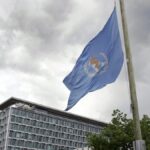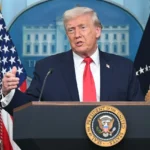Table of Contents
In a bold and controversial move, the Trump administration has announced it will “aggressively” revoke visas of Chinese students currently studying in the United States. This latest action, aimed at those with alleged ties to the Chinese Communist Party or those studying in fields deemed “critical,” marks a sharp escalation in tensions between Washington and Beijing. The decision comes amidst a broader backdrop of a trade war and diplomatic friction between the two superpowers.
What’s Behind the Visa Revocations?
Secretary of State Marco Rubio confirmed the policy, highlighting that the administration plans to work closely with the Department of Homeland Security to revoke visas and tighten future visa approval criteria for Chinese nationals, including applicants from Hong Kong. This enhanced scrutiny targets individuals involved in sensitive academic fields or connected to the Chinese government in any capacity.
The move is part of a wider strategy by the Trump administration to counter perceived national security risks. It reflects growing concerns over espionage, intellectual property theft, and undue influence within American academic institutions.

The Scale and Implications
Last year, roughly 280,000 Chinese students were enrolled in US universities, making them the largest group of international students. However, the number has been declining recently due to a combination of pandemic travel restrictions and worsening bilateral relations.
The Trump administration’s visa crackdown could further reduce this number. While it remains unclear exactly how many students will be affected, the repercussions could be significant, both for the students themselves and for American higher education institutions.
Many US universities rely heavily on international students, including those from China, as they pay higher tuition fees. These funds support research, scholarships, and campus resources. Consequently, visa restrictions threaten not only individual students’ academic futures but also the financial health of these universities.

Reactions from China and the International Community
China has firmly opposed the visa revocation plan. Officials have called on the US to protect the rights of international students and urged for more constructive dialogue between the two countries. Beijing views this move as yet another escalation in the ongoing political and economic rivalry.
The Trump administration’s restrictions have extended beyond visa revocations. On the same day as Rubio’s announcement, US embassies worldwide were instructed to stop scheduling new student visa appointments. This halt further complicates matters for prospective Chinese students hoping to study in America.

Impact on Students and Universities
International students caught in this policy shift express deep regret and anxiety. Many worry about their ability to complete their studies and the risk of being forced to return to potentially unsafe environments. Some students have canceled graduation ceremonies or even begun transferring to universities in other countries.
Harvard University has been one of the most vocal opponents of the policy. Recently, a judge temporarily blocked the administration’s attempt to revoke Harvard’s ability to enroll international students. Harvard officials argue that the visa restrictions inflict significant emotional distress and threaten the university’s global standing and diversity.

Broader Context: A Clash of Geopolitics and Academia
This visa crackdown is a symptom of the increasingly tense US-China relationship. It reflects how geopolitical rivalries can spill over into academic and cultural exchanges. The Trump administration views some American universities as politically biased and not doing enough to address issues such as antisemitism, adding another layer of conflict.
On the other hand, critics argue that targeting students based on nationality or political association risks undermining academic freedom and international collaboration, which have long been hallmarks of American education.

What Lies Ahead?
The policy’s full impact remains to be seen. Legal challenges are underway, and diplomatic tensions continue to simmer. Meanwhile, students and universities must navigate an uncertain landscape that could reshape international education in the US for years to come.
As the world watches, this episode highlights the fragile balance between national security concerns and the open exchange of ideas that global education embodies.
Author Profile
- Syed Tahir Abbas is a Master's student at Southwest University, Chongqing, specializing in international relations and sustainable development. His research focuses on U.S.-China diplomacy, global geopolitics, and the role of education in shaping international policies. Syed has contributed to academic discussions on political dynamics, economic growth, and sustainable energy, aiming to offer fresh insights into global affairs.
Latest entries
 U.S. Foreign PolicyFebruary 2, 2026AI and Grand Strategy: The Case for Restraint – Navigating the Future of American Power
U.S. Foreign PolicyFebruary 2, 2026AI and Grand Strategy: The Case for Restraint – Navigating the Future of American Power National SecurityJanuary 31, 2026Treating China’s Connected Energy Systems as a National Security Risk
National SecurityJanuary 31, 2026Treating China’s Connected Energy Systems as a National Security Risk Global HealthJanuary 29, 2026The Future of the WHO—and How the United States Can Shape It
Global HealthJanuary 29, 2026The Future of the WHO—and How the United States Can Shape It Global TradeJanuary 22, 2026Trump Cancels Tariffs on European Nations Over Greenland Pursuit?
Global TradeJanuary 22, 2026Trump Cancels Tariffs on European Nations Over Greenland Pursuit?



4 comments
I love the way you bring fresh perspectives and engaging storytelling to every post,, keep inspiring and creating, looking forward to more amazing content from you.
I love the way you bring fresh perspectives and engaging storytelling to every post,, keep inspiring and creating, looking forward to more amazing content from you. Keep writing without stopping.
You make complex ideas feel so simple and relatable. Love that about your blog!
**mitolyn official**
Mitolyn is a carefully developed, plant-based formula created to help support metabolic efficiency and encourage healthy, lasting weight management.